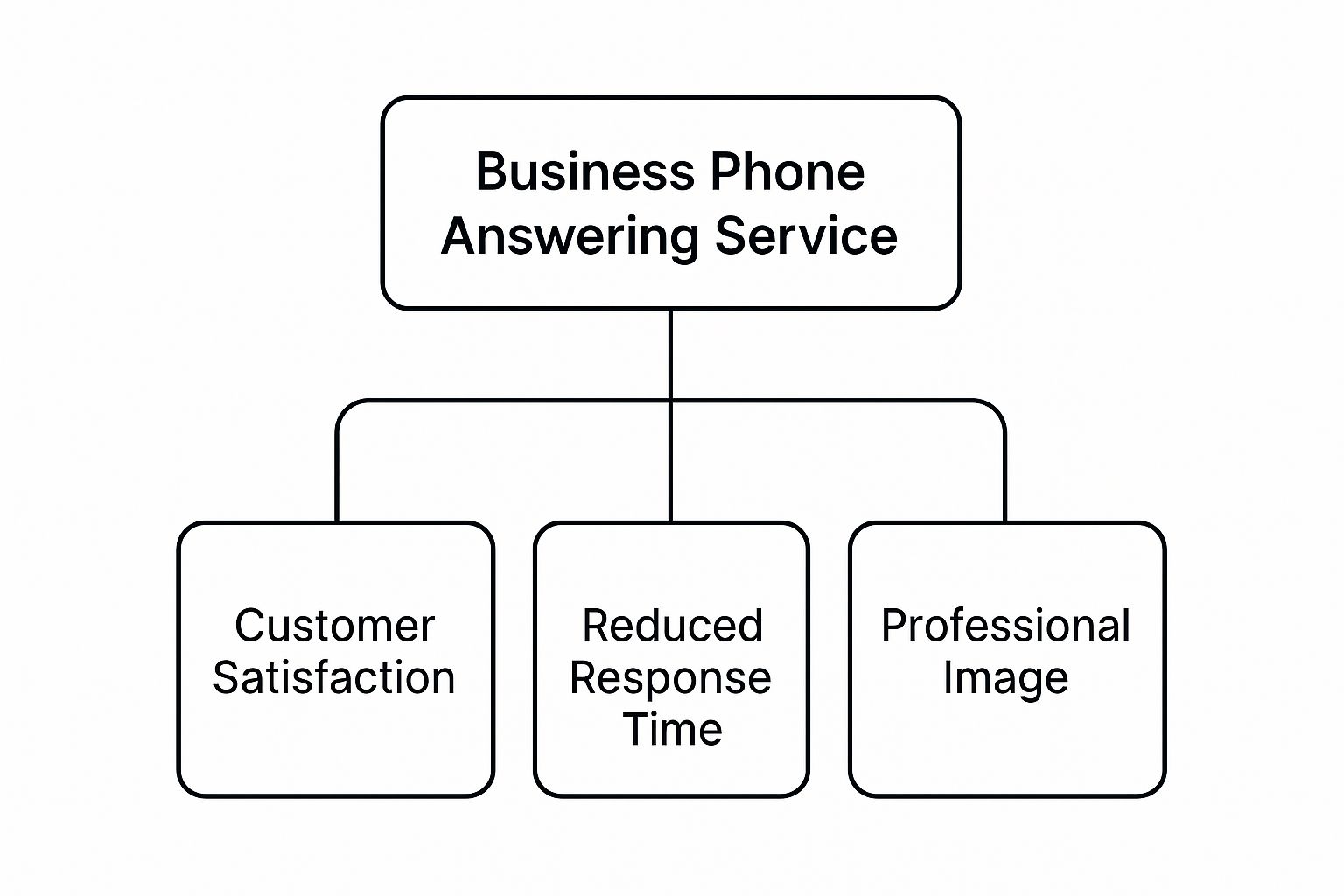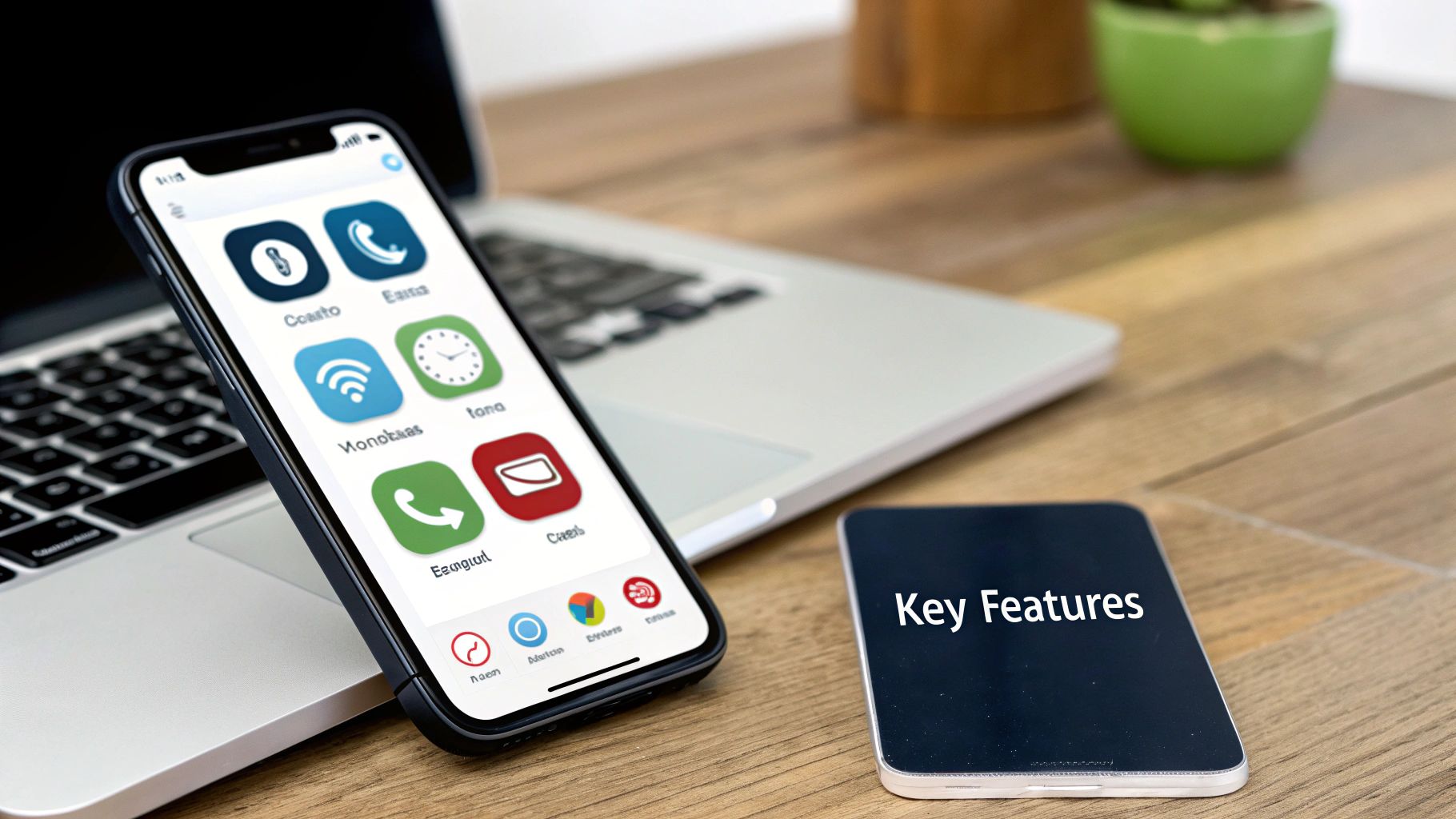At its core, a business phone answering service is like having a professional, remote front desk for your company. It’s a service that guarantees every single incoming call gets answered by a real, live person, 24/7.
This setup is designed to capture leads, help customers, and give your business a polished, always-available image—all without the overhead of hiring a full-time, in-house receptionist.
Think of it as a dedicated hospitality team just for your phone lines. Instead of going through the entire process of hiring, training, and managing an employee to sit at a desk, you partner with a company that specializes in this.
Their trained agents become a seamless extension of your brand. They're ready to handle calls anytime, day or night, so you don't have to.
And this isn't about those robotic, automated menus we all hate. There's a huge difference between a live virtual receptionist and a basic Interactive Voice Response (IVR) system. An IVR makes callers navigate a frustrating phone tree ("Press 1 for sales..."). A live agent, on the other hand, provides an immediate, human connection. That personal touch is what makes a great first impression and solves customer problems quickly.
The real magic of an answering service isn't just picking up the phone; it's the strategic impact it has on your business. This is more than an admin task—it's a powerful tool for growth.
By outsourcing call handling, you ensure no opportunity is ever lost. Every ring could be a new sale, a client needing help, or an important business inquiry. A professional service guarantees these are captured, even after hours or when your team is swamped.
This round-the-clock availability delivers some major wins:
This infographic breaks down how a business phone answering service directly fuels your core business goals.

As you can see, the service acts as a foundation for a better customer experience and a highly professional brand image. It’s no surprise that businesses everywhere are catching on.
The global market for these services has ballooned to an estimated $8.4 billion. The Americas ($3.4 billion) and Europe ($3.0 billion) lead the way, proving just how vital this function has become in modern business. You can dive deeper into these numbers over at KentleyInsights.com.
Key Takeaway: A business phone answering service is all about creating positive, reliable, and professional interactions with every caller. It’s how you turn curious prospects into loyal customers and make a strategic investment in your brand’s reputation and accessibility.
Deciding between hiring someone in-house and partnering with a service can be tough. Both have their place, but they serve very different operational and financial needs. We've put together a quick comparison to help you see the key differences at a glance.
As the table shows, an in-house receptionist offers a dedicated presence during office hours, while an answering service provides unmatched flexibility, coverage, and cost-efficiency, especially for businesses that need to be "on" all the time.
Okay, so we've covered the "what" of a business phone answering service. Now, let's get into the strategic "why." This isn't just about making life a little easier; it's about real, measurable growth for your company. Handing off your call handling is a business decision that directly fuels your revenue, productivity, and brand reputation.

Think about a plumbing contractor deep into a complex installation. The phone rings—it's an emergency burst pipe, a high-value job that needs an immediate response. Instead of that call going to voicemail, a remote receptionist calmly gathers the new client's details, secures the job, and slots it into the schedule. The plumber finishes the current task without breaking focus, then heads straight to the next profitable opportunity.
That's the power of a professional answering service in action.
Every single call you miss is a potential customer walking out the door. When people hit your voicemail, most of them won't bother leaving a message. They’ll just hang up and call your competitor. A 24/7 answering service is your safety net, making sure you catch every single lead, no matter the time of day or night.
This always-on availability is a game-changer, especially for service businesses where people expect an instant answer. Just picture these scenarios:
A phone answering service ensures your business is always open for business, turning missed calls from liabilities into valuable revenue streams. This constant readiness builds a reputation for reliability and accessibility that customers appreciate.
By giving every caller an immediate, professional response, you’re not just winning new business. You’re also proving your value to your existing clients, every single time.
Let’s be honest: a constantly ringing phone is a productivity killer. It shatters concentration and pulls your skilled team away from the core work that actually makes you money and moves the business forward. Outsourcing your calls removes this distraction completely.
When your team is free from fielding routine calls, they can dedicate their full attention to high-value activities. Your sales team can focus on closing deals. Your technicians can complete jobs more efficiently. And you, the owner, can finally work on the business instead of getting stuck in it.
The return on investment (ROI) here is incredibly clear. For example, an investment of just $1,000 in an answering service can easily bring in $3,000 in new business and retained customers—a 200% return. Beyond the direct cash flow, the service pays for itself by freeing up valuable time for growth-focused work.
Hiring a full-time, in-house receptionist involves way more than just a salary. You have to factor in payroll taxes, benefits like health insurance, paid time off, and the costs of a desk, computer, and training. Those expenses stack up fast, creating a significant fixed cost.
A business phone answering service offers a much smarter, more cost-effective model. You get access to a full team of trained professionals for a fraction of what it costs to hire a single employee. This flips a large fixed expense into a manageable, variable one that can grow or shrink with your needs.
When thinking about your operations, it's worth weighing the pros and cons of automation vs. outsourcing to see what fits best. This kind of strategic shift frees up your budget for things that actually grow the business, like marketing or product development.
Not all answering services are built the same. While pretty much any service can take a message, a truly effective business phone answering service comes packed with features designed to solve real operational headaches and actually push your business forward.
Knowing what these features are is the key to picking a partner that acts like a growth engine, not just a message pad.

Think of it like buying a car. A basic model gets you from A to B, sure. But it's the features—the GPS, the advanced safety systems, the powerful engine—that really define the quality of the ride. The right features in an answering service can completely change how your business operates day-to-day.
The most fundamental feature has to be 24/7/365 availability. Your office might close at 5 PM, but your customers' needs definitely don't clock out. A potential client could be doing research late at night, or an existing customer might run into an urgent problem over a holiday weekend.
Without someone there to pick up, those opportunities go straight to a cold voicemail box or, even worse, to your competitors. A service that guarantees a live human will always answer makes your business feel like it's always open, ready to capture leads and offer support whenever someone calls. This constant accessibility builds a rock-solid reputation for reliability.
If you run a service-based business—think salons, clinics, or consulting firms—the phone is probably ringing off the hook with appointment requests. Trying to manage that manually can completely derail your team's focus. This is where an answering service with integrated scheduling capabilities becomes a total game-changer.
Instead of just jotting down a message, agents can tap directly into your calendar to book, reschedule, or cancel appointments in real-time.
This single feature transforms your answering service from a passive message-taker into an active administrative assistant who directly contributes to your bottom line.
Let's be honest: not every call needs your immediate, undivided attention. Many are just routine questions that a standard answer can solve. Custom call screening lets you set the rules of engagement for how different types of calls are handled.
You can create clear protocols that tell the agent which calls are emergencies that need to be transferred to you immediately, and which ones can be handled with a simple message. It acts as a protective filter for your time, ensuring only the critical stuff gets through while everything else is still handled with absolute professionalism.
This level of control means you stay focused on high-value tasks without the nagging fear of missing something important. It’s the perfect balance between being accessible and actually being productive.
A truly great phone answering service doesn't just answer the phone; it actively helps you build your sales pipeline. With lead capture and qualification features, you can arm the agents with a specific script of questions to ask potential new customers.
This process ensures every new inquiry is properly vetted. Agents can gather key details like the caller's specific needs, their budget, and their timeline. The result? Your sales team gets a list of well-qualified, warm leads instead of a cold list of names and numbers. It shortens the sales cycle and gives your conversion rates a serious boost.
Many services can even plug this data directly into your CRM. To get a better sense of how these modern tools operate, you can check out the range of AI receptionist features available on today's platforms.
To help you decide what's most important, it helps to connect a feature directly to the value it brings to your business. This table breaks down the essential features and shows you exactly what they do for you.
Looking at the features this way helps you move beyond the checklist and focus on the capabilities that will have the biggest impact on your daily operations and long-term goals.
Choosing a business phone answering service is a big deal. You’re not just hiring a vendor; you’re bringing on a partner. This partner becomes the voice of your brand, often making that critical first impression on new and existing customers. Get it right, and every caller feels heard and valued, reinforcing what your company stands for.
This decision goes way beyond a slick sales pitch or a rock-bottom price. You need to really dig in and understand how they operate, what their strengths are, and if their tech can actually help you grow. Picking the wrong partner can lead to ticked-off customers and missed opportunities. The right one? They can be a serious engine for growth.
Let's be honest, a one-size-fits-all approach to answering calls just doesn't cut it. The first thing you need to check is whether a potential provider has real, hands-on experience in your industry. The way a medical clinic handles calls is a world away from how a law firm or a plumbing company does.
Look for a service that already speaks your language and understands the unique compliance rules and customer expectations in your field.
A partner with industry expertise won't need you to teach them the basics. They'll come prepared with established best practices, relevant scripts, and an understanding of your customers' expectations from day one.
In a connected world, your answering service can't be an island. For your workflow to stay smooth, it has to integrate seamlessly with the software you already use every day. A service that can plug directly into your existing tools is a game-changer, wiping out manual data entry and keeping information flowing.
Just imagine an agent books an appointment, and it instantly pops up on your Google Calendar. Or a new lead’s info automatically gets added to your CRM. That’s the kind of integration that turns an answering service into an administrative powerhouse, freeing up hours for your team. Before you commit, make sure they can connect with your core systems.
Answering service pricing can feel a bit murky, so finding a provider with a clear, straightforward structure is key. Most services fall into one of two buckets, and the best fit for you really depends on how many calls you get and how predictable that volume is.
Comparing Common Pricing Structures
Always ask for a full breakdown of what’s included—and more importantly, what isn’t. Are there hidden charges for holidays, call transfers, or after-hours support? Getting clarity upfront saves you from nasty surprises on your invoice.
To see what a simple, no-nonsense structure looks like, check out different phone answering service pricing options and see how they stack up against your budget. A little homework now will help you find a plan that delivers real value without the hidden fees.
You might think that switching to a business phone answering service is a massive, complicated project. It’s really not. A good provider will walk you through everything, making the whole process surprisingly painless. Their goal is to get their team up to speed so they can act as a seamless extension of your own crew from the very first call.

Honestly, the best way to think about it is like training a new employee. You're giving them the information they need, setting clear expectations, and equipping them to represent your company just right. The entire setup is designed to get your new virtual receptionists perfectly in sync with your business.
It all starts with a simple discovery call. This is your chance to lay it all out—your specific needs, how many calls you get, and the big headaches you're trying to solve. Your provider will dig in to understand your business, from your hours of operation to the exact tone you want callers to hear.
This conversation is the bedrock for building out your call script. And don't worry, this isn't some rigid, robotic script. It's more of a flexible guide that helps agents answer common questions, handle different inquiries, and nail your brand's voice. A solid script is the key to making sure every single call feels professional and consistent.
A great script should cover:
Once the script is locked in, it's time for the technical part. This sounds more intimidating than it is. It's mostly just setting up call forwarding, which is just a fancy way of telling your phone system to send calls to the answering service.
You get to decide exactly when this happens:
Next up is connecting the service to the software you already use. This is where you can get some huge efficiency wins. Linking the service to your CRM or calendar app lets agents book appointments directly into your schedule or log new lead info automatically. No more tedious data entry for you or your team.
Pro-Tip: If they offer a trial period, take it. This is the perfect way to test-drive your scripts and see how everything works in the real world. You can iron out any kinks before the official launch.
With all the technical pieces in place, you're ready to go live. The last, crucial step is setting up clear rules for how agents should handle different calls—especially the urgent ones that need to be escalated.
Before you flip the switch, make sure everyone knows the procedure for emergencies. For example, if a major client calls with a fire-drill issue, who on your team gets that call immediately? And what's the best way to reach them? Giving the service clear instructions empowers them to manage situations confidently and ensures you never miss a truly critical call. A little planning here is what makes this partnership a real success.
A business phone answering service isn't a one-size-fits-all solution. Far from it. Its real strength is how it can be molded to fit the unique rhythm of any business. Think about it: how a busy law firm screens potential clients is worlds apart from how a home services company handles middle-of-the-night emergencies.
By looking at how different businesses put these services to work, you can start to see how this tool could plug the specific gaps in your own operations. Each one of these stories shows a business turning a simple phone call into a real competitive edge.
Imagine a small law firm that specializes in personal injury cases. Their biggest challenge? Capturing new leads the second they reach out. People often look for a lawyer right after an incident, and that rarely happens during a neat 9-to-5 window. A missed call is almost always a lost case.
This is where an answering service becomes their frontline. Every after-hours call is answered by a trained agent who follows a precise script for a preliminary client intake. They gather the crucial details—what happened, contact info—and securely pass it along. The legal team walks in the next morning with a qualified lead ready for follow-up.
Now picture a bustling pediatric clinic. The phones are ringing off the hook with appointment requests, prescription refills, and routine questions. This constant barrage ties up the front desk staff, pulling their attention away from the families and patients right in front of them. The challenge isn't just managing the call volume; it's doing so while maintaining strict HIPAA compliance.
The clinic brings in a specialized medical answering service. These agents aren't just answering phones; they're trained in patient privacy protocols. They can book appointments directly in the clinic’s software and take detailed, secure messages for refill requests, freeing up the in-office team to focus entirely on patient care.
Key Insight: For industries with heavy compliance burdens like healthcare, a specialized answering service isn’t just a nice-to-have. It’s a critical part of protecting sensitive information and upholding professional standards.
Consider a 24-hour plumbing company. A burst pipe at 3 AM is an absolute emergency that demands an instant response. The owner can't risk missing that call while they're on another job or, you know, sleeping. The real trick is separating the "my sink is dripping" calls from the "my basement is flooding" calls and acting on the urgent ones immediately.
Here, the answering service acts as a central dispatch. Agents use a custom protocol to screen every call. If it's a non-urgent query, they'll schedule a callback for business hours. But if it's a true emergency, they follow a dispatch tree to contact the on-call technician right away. This rapid response doesn't just fix a leak; it builds incredible customer trust.
You can explore a huge range of solutions tailored for different verticals to get a better sense of how this specialization plays out across dozens of other fields.
Even after seeing all the benefits laid out, it's totally normal to have a few lingering questions before you bring on a business phone answering service. Let's tackle some of the most common things business owners ask, giving you straight answers so you can move forward with confidence.
Nope, not if you partner with a professional service. The entire experience is designed to feel like a seamless extension of your own company.
These agents aren't just reading from a generic script; they're trained on your business's specifics. They'll use the custom greeting you provide and follow your exact instructions for different types of calls. From your customer's perspective, they're simply talking to a well-trained, helpful member of your in-house team.
Key Insight: The best answering services don't just answer calls—they become your brand's voice. This consistency is what builds trust from the very first ring, making callers feel like they are speaking directly with your company.
This is a big one, and the answer is: it really depends. Costs can swing quite a bit based on the provider you choose, the features you need, and how many calls you expect to get. Most services use one of a few common pricing models:
For a business with pretty low call volume, basic plans can start as low as $50–$150 per month. If you need more advanced features or handle a lot of calls, you could be looking at a range from $300 to over $1,000. It's a smart move to compare the best small business answering service options to see which pricing model really lines up with your business needs.
This is a great question, and it's something every business owner should think about. You're in complete control here. During setup, you'll work with the service to create clear rules for exactly these kinds of situations.
If a caller has a tricky question that's outside the agent's script, they will follow your specific instructions to the letter. This might mean they take a detailed message for an expert on your team, transfer the call straight to an employee's cell, or even schedule a callback for a more convenient time. You decide how every call gets handled, ensuring nothing ever falls through the cracks.
Ready to see how an AI receptionist can transform your business communications? With My AI Front Desk, you get an intelligent solution that captures every lead, schedules appointments, and provides exceptional service 24/7. Explore our powerful features and start converting more callers into customers today at https://myaifrontdesk.com.
Start your free trial for My AI Front Desk today, it takes minutes to setup!








